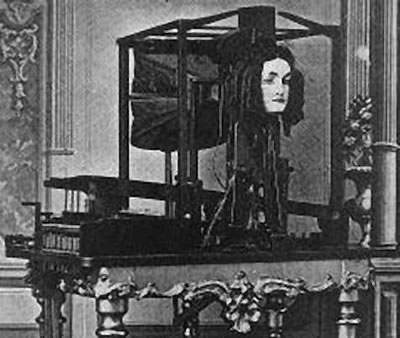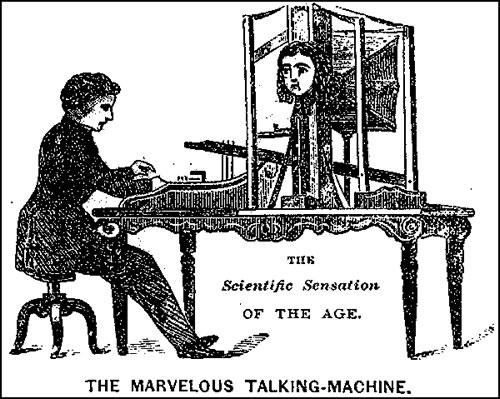Nearly 170 years before Siri, German inventor Joseph Faber demonstrated his Talking Machine, most commonly known as “Euphonia,” which was able to speak sentences in a human if monotone voice. The marvel became a staple of Barnum’s shows, but Faber died without much to his name in the 1860s and his wife–and his contraption–fared just as poorly. Two brief articles follow about the inventor and his machine from the Brooklyn Daily Eagle.
_____________________
“Talking Machines” (October 15, 1870): ”Some readers may remember Professor Faber’s automaton speaking figure, called THE EUPHONIA, when exhibited in London. It was a draped bust with a wax face. Concealed from the visitors were sixteen keys or levers, a small pair of bellows, and numerous little bits of metal, wood, and India-rubber. When any word or sentence was spoken out, either by Faber or by one of the audience, the exhibitor mentally divided all the syllables into as many distinct sounds as they embodied; he pressed upon a particular key for each particular sound, which admitted a blast of air to a particular compartment, in which the mechanism was of the kind to produce the sound required; there were thus as many pressures as there were elementary sounds. By a modification of the movements, whispering could be produced instead of speaking.”
_____________________
 “The Talking Machine Was There” (July 24, 1887): “Mrs. Mary Faber, the wife of Professor Faber, who had traveled around the country for years with his talking machine, took Paris green yesterday at 207 East Twenty-Fifth Street, New York. When the police were about to take her from the room Mrs. Faber recovered consciousness for a moment and, pointing to a satchel, declared that the talking machine was there. She wanted it sold to pay the rent. She will probably die.”
“The Talking Machine Was There” (July 24, 1887): “Mrs. Mary Faber, the wife of Professor Faber, who had traveled around the country for years with his talking machine, took Paris green yesterday at 207 East Twenty-Fifth Street, New York. When the police were about to take her from the room Mrs. Faber recovered consciousness for a moment and, pointing to a satchel, declared that the talking machine was there. She wanted it sold to pay the rent. She will probably die.”

